- Home
- Trevor Hoyle
Vail Page 9
Vail Read online
Page 9
‘What else can they possibly, – ’
‘Political affiliations, trade union membership, associations, societies, clubs, pastimes, hobbies and recreational activities proscribed by Act of Parliament.’
‘Sure you haven’t missed anything out?’
‘Blood relations suffering or known to have suffered from diabetes, angina, liver trouble, leukemia, Parkinson’s disease, Kaposi’s sarcoma, piles, mental illness, insomnia …’
I wound the window up.
We tailgated at a snail’s pace for about a mile, and with every metre nearer the checkpoint my trepidation increased logarithmically until I found myself in a sweating blue funk. Brown. He had to be got rid of. His mug and bio would be in their computer memory store. He would be detained and interrogated, and us, the Vail family, by association, with him. I could glaswellt, I supposed, and claim the reward, but how to explain we’d harboured a known subversive for nearly two hundred miles? Besides, he’d have his revenge by implicating us in his terrorist fantasies. He’d refer to us as ‘comrades’ and eulogise our support and friendship, winking conspiratorially at the investigating officer and implying that Mira was a damn good sqriw (true, she was, biting, scratching, moaning fit to wake the dead) and that it was common practice in our ‘circle’ to share the women like picnic food.
(Yes, and that was another reason why he deserved to be dumped without mercy, – his putative sexual congress with my wife. He had one hell of a nerve, after all I’d done for him, the swine.)
I told him to go, and to take his precious bloody bundle with him. I couldn’t take the risk any longer. I had my family to consider. He replied that he could hide in the long drawer underneath the bunk, and I told him not to be such a bloody fool: the checkpoint guards would strip us down to the differential and filter the oil in the sump through muslin if need be. He was jeopardising our chances by remaining, didn’t he see that? Where was his common decency, his sense of gratitude and brotherly concern? He didn’t need me to give him lessons in that, he informed me brusquely. He hadn’t noticed me overflowing with the milk of human kindness and compassion, not by a long chalk. Well, was he going to leave of his own accord or did I have to forcibly eject him? Me forcibly eject him? he scoffed. That’ll be the day. I told him then and there that my patience was fast running out; moreover, I’d dealt with tougher cookies than him in my time, and if he wanted a physical confrontation he could have it, and welcome, in spades.
At this juncture in our heated exchange we were less than a mile from the checkpoint, inching forward amongst three solid lanes of nose-to-tail traffic. It was another hot day and the engine pulsating beneath me was an apt metaphor for my rage and frustration. Both of us, it seemed, were likely to explode at any moment.
Mira was saying something to Brown, too low for me to catch. Was she remonstrating with him, pleading with him, sympathising with him, imploring him to take her with him? Not the latter, I was certain: she was too attached to Bev.
As we crept past the half-kilometre marker I heard the side door slam and when I looked over my shoulder Brown had gone. Mira’s remonstrances, pleadings, cajolings or whatever had ostensibly done the trick. We were rid of him at last! We could approach the checkpoint with confidence, secure in the knowledge that we had nothing to hide, were blameless of any crime against the state and could not be accused of subversive or terrorist affiliations. Involuntarily my shoulders sagged out of sheer relief. I said aloud, ‘Thank God for that,’ but either Mira didn’t hear or chose not to respond.
The guards were of the shiny black beetle variety, with tinted visors masking their eyes. Dutifully I followed the pointing black stun stick into the wire-mesh-enclosed bay and, obeying the sign, cut the engine. In the bay to our right a silver-grey Mercedes was ghosting through, not stopping, the occupants not even bothering to wind the windows down, and reclining in the back watching TV I recognised the familiar lithe form of Steve Davis, world champion snooker player and variety show guest star, clad in a dark-green polo-neck sweater, light-grey slacks and alligator-skin shoes decorated with little gold chains.
At his request I gave the guard all the papers we had. He thumbed through them and said, ‘Resident Alien permit, yellow card?’
‘No. Sorry. You see, my daughter’s ill and we’re taking her, – ’
He didn’t even let me finish, but pointed with his stun stick to a slip road off to the left. ‘Move along.’
‘But isn’t it possible, – ’
‘Move along, you’re blocking traffic.’
‘Could I speak to someone in, – ’
He gave me one look through the tinted visor and I started the engine and took the slip road to the left. The slip road curved back on itself and three hundred metres farther on we came to a roundabout signposted
A422 EAST →
←A422 WEST
Ml NORTH ↑
Most of the rejected traffic was taking the M1, but I was damned if I was going to give up so easily, and swung onto the A422 East and drove towards Bedford. Wrecks and abandoned vehicles lay on the grass verges at both sides of the road; other hopefuls, who had made it this far and no farther.
Mira remained silent, no doubt sick at heart that we’d failed to pass through. I hoped she wasn’t going to blame it on me. I’d had a bellyful.
Periodically, to our right, glimpsed through trees and in-between buildings, I could see the wire topped with white ceramic insulators. It stayed in view for several miles until we reached a place called Bromham, a small village where the A422 meets the A428. At the crossroads there were signs pointing north to Northampton and Wellingborough and east to St Neots and Godmanchester. The signs to the south were plastered with large ACCESS RESTRICTED TO AUTHORISED VEHICLES notices, red letters on a white ground. Bedford itself was behind the wire inside this zone, and therefore off-limits.
I pulled over into a lay-by and switched off the engine. When I climbed stiffly and wearily into the back the reason for Mira’s prolonged silence became apparent: she was casually sprawled out on the bunk opposite Bev, wearing blue lipstick which clashed badly with her bloodshot eyeballs staring up at me. There were no signs of struggle or sexual interference, though her fingers still clutched the flowered coverlet, and in places her nails had pierced through and were dug deep into the latex foam.
Around her throat, like a velvet choker, a thick black fabric belt (such as might have belonged to a heavy black overcoat) was tightly bunched and knotted behind her neck in a writhing thick black tangle in which some of her bleachily-streaked hair was trapped.
The three of us wandered the countryside in the vicinity of St Neots for a while, vainly seeking a way through, under or over the wire south, then towards the evening of the second day Mira began to smell and so I buried her. The logistical problems were becoming more and more acute. Petrol I could get, fairly easily, by the usual method, but food was dangerous. I didn’t want to break into anyone’s house for fear of getting shot, and the only other alternative was shop-lifting, which was nerve-racking business, I can tell you. I broke out in a sweat of panic fear every time I entered a shop, which was a dead giveaway. Something I learned to do was keep my mouth shut. In Waitrose I made the mistake of asking a woman where the dairy produce was and she reared back and regarded me flatly over her packed bosom and asked me where I came from. I indicated with my thumb a region somewhere over my right shoulder and said, ‘North.’
‘The North?’
I nodded without speaking.
‘Thought so. I can see it in your face.’
Instead of being circumspect and moving on I said rashly, ‘What can you see?’
‘Workshy. Shiftless. Sneaky. Untrustworthy. Layabout.’
‘Oh?’
‘You Held the Country to Ransom and Priced Britain Out of World Markets and now you’re unemployed you’re forever looking for State Handouts and Fiddling the Social Security and Sponging Off Society.’
I now kept my mouth shut. Other peopl
e gathered as the woman went on:
‘This Country doesn’t Owe you a Living, you know. If you hadn’t Wrecked Britain’s Economic Performance with your Excessive Wage Demands and Restrictive Practices we might still have a Favourable Balance of Payments. As it is we’re Bottom of the Uropean League Table, Begging for Crumbs at the Rich Man’s Table.’
Her face was round and smooth and high-coloured, polished to a sheen like a rosy apple. I had read Enid Blyton as a child and that’s who she reminded me of, though I had no idea what Enid Blyton looked like. She wore a cardigan with pearl buttons fastened up to the neck and a fine woven houndstooth skirt with small pleats at either side.
Still I said nothing.
‘What are you doing down here anyway? There’s nothing for you here. We don’t want your dirt and disease, your AIDS and Down’s Syndrome. Get back up North where you belong.’
‘Yes, why are you here? What is it you want?’ said a tall bleak man with spectacles and a lipless mouth whose jacket hung emptily on him as on a coat-hanger. ‘Do as this lady says and return to those streets where one assumes you eat tripe and black puddings out of tin baths, don’t wash your feet and wear flat caps in bed. Haven’t you done enough harm?’
The lady in cardigan and houndstooth skirt said, ‘There’s no reasoning with them. For generations they were kept in their place, docile, subservient, fawning, grateful for what they were allowed to have and we were generous enough to give them. Then they got ideas. I blame ITV. Can you imagine, – fitted carpets, central heating, freezers, video recorders and double glazing in a slum! The idea! Spoiled? I should indubitably say so!’
I had some vacuum-packed boiled ham inside my shirt and half a pound of foil-wrapped coffee in my underpants, so I thought it expedient not to refute these sentiments. I would have to shop-lift elsewhere for my dairy produce. I eased myself out of the crowd.
‘See? Look at him, sloping off!’ said another woman with snide gusto. She was younger than the first woman, and rather attractive, blonde hair swirled up onto the top of her dainty head and held in place by a diamanté comb. ‘Typical.’ She screwed up her face. ‘Bloody bolshie bastard!’
The tall bleak man poked a finger into me, just missing the boiled ham.
‘You do realise what you’ve done, don’t you? You and the rest of your lazy good-for-nothing pals? Sold This Country Down the River. That’s what. Brought This Once-Proud Nation to its Knees. Well. I suppose you’re happy now, aren’t you? I suppose you’re satisfied. I suppose you expect the rest of us to keep you in the style to which you’ve become accustomed, don’t you?’
Enid Blyton kicked me on the shinbone. My gasp of pain triggered the latent fury residing a bare millimetre beneath the ordered, genteel exterior of these good people, causing someone at the back to throw a 500 ml carton of Cornish double cream which exploded and ejected its contents down the front of my shirt. Other esculent missiles followed in rapid, accurate succession, some of them hard such as jars of Chiver’s thick cut marmalade, others soft and splattery: yoghurt, fruit, eggs, tomatoes, for example. I ran into the street stinking and afraid; they would have thrown warm turds had there been any to hand.
By sounding the long ‘a’ and softening my speech to a suave murmur I succeeded in asking directions to the nearest hospital and received a helpful, non-hostile reply. The two-storey building was modern and new, set in its own grounds laid out with skill, expense and professional pride. There was even, as I recall, a small ornamental lake with weeping willows and lily pads.
It was dusk when I drove through the wrought-iron gates and parked between the yellow lines, covering over a stencilled hieroglyph which read: ‘AG/C2’.
I wrapped Bev in a tartan blanket and carried her up the steps into the glazed reception hall. The doors slid open noiselessly at my approach and closed just as silently behind me. Neat wooden signs stuck out at right-angles along a restful green corridor, their black lettering sealed inside a coating of quick-wipe glare-free polyurethane: E.N.T., OCC. THERAPY, E.C.G., OPTH. SURG., SR. NRS. OFF., W.C. The lighting was of the diffused type so that it didn’t hurt one’s eyes. There was no one about.
I walked on the rubbery yielding floor, holding Bev firmly because it seemed that if I didn’t she might float away. Her face had that translucent quality you might have seen in paintings of the madonna or in photographs of babies inside their mothers’ wombs.
A heavy-busted nurse, all crackling starch and plastic pen-tops, passed directly across the corridor in front of me, in transit between wards, swivelled in mid-stride and came back to confirm her first subliminal impression.
‘Might I inquire where you’re taking that child?’
‘Hello, nurse. This is my daughter, Bev. Could you find someone to attend to her? I think she’s dying.’
‘Nonsense,’ the nurse said briskly, who according to her blue plastic name tab was Staff Nurse P. Bracegirdle. Without looking at Bev, she said, ‘This isn’t a casualty hospital. The nearest one is in Huntingdon. You can’t miss it, it’s directly off the Al.’
‘She isn’t a casualty, she’s dying,’ I said. ‘Please find a doctor. I’ll wait here.’
‘Do you suppose that doctors are at your beck and call?’ Her tone of voice was finely balanced between amused irony and a stern affront. Then, almost immediately, her precise eyebrows snapped together in an accusing frown. ‘You’re not local. You don’t sound local. Are you local?’
‘Under the circumstances is it important? Please find a doctor for her. We can discuss my antecedents and geographical heritage later.’
She didn’t intend to budge, that much was plain. How long could we stand here, confronting one another? I stepped round her and continued on my way. Staff Nurse Bracegirdle came after me but drew the line at actually touching my stiff pungent shirt. She had caught a whiff of sour cream, eggs and yoghurt in my passing. We bandied more words, the upshot of which was that she backed away, both slender sanitised palms upraised, and said, ‘If you’ll stay here and promise not to move I’ll see if I can get someone.’
Thus it was that I came to be ushered into the presence of Dr Tocktor, a small grey eminence sitting behind a plain bare desk in a tiny room with one window. It was dark outside, the curtains were undrawn, and in the hard black rectangle I could see myself mirrored holding a limp blanket in my arms.
Dr Tocktor didn’t speak, merely pointed to a wooden chair. There were voices and footsteps in the corridor. The door opened and Staff Nurse Bracegirdle entered followed by three people in white coats, all of whom arranged themselves, standing, on either side of Dr Tocktor, which while bolstering his authority and prestige made him seem smaller, greyer, more shrunken than before. Almost insubstantial, in fact, so that in my fevered imagination I could see through him to the chair in which he sat.
‘Doctor’s waiting,’ said Staff Nurse Bracegirdle.
I began. ‘I would be most grateful, doctor, if you could spare the time to look at my daughter Bev. As you can see, she’s very ill. If she doesn’t receive some attention soon she’s going to die, – ’
‘Are you a doctor?’ interrupted one of the others. I shook my head and this same person went on, ‘Dr Tocktor’s had over twenty-five years’ experience. A little bit more than you, I dare say.’
I had to agree. ‘I’m sure the doctor is highly qualified, – ’
‘Very highly qualified,’ another of the people said. ‘No one has ever questioned Dr Tocktor’s expertise and professional integrity in all the years he’s been working here. He’s noted for it.’
‘I’m glad to hear it.’
‘And so you should be.’
‘I am, – ’
‘Twenty-five years,’ said Staff Nurse Bracegirdle vehemently. ‘Have you any idea of the sacrifices and dedication and heartaches that has entailed? The exams he had to pass, the years of penny-pinching, the bone-weary hours late at night when he was dead on his feet and would have loved a long hot soak and a good night’s sleep but had
to carry on regardless till the early hours of the morning? You can’t conceive.’
‘No, I can’t,’ I admitted. ‘I’m sure the doctor is everything you say he is – very highly qualified, with long experience, expert and dedicated and so on.’
There were one or two satisfied nods. They had made their point.
Dr Tocktor hadn’t spoken a word or moved a muscle during this. He was gazing in my general direction but not quite at me, at a spot on the wall about nine or ten inches to my left. Had he taken any of this in? I wondered. Was he with us in spirit if not in the flesh?
‘What’s the matter with daughter?’ asked one of the standing people.
‘I don’t know, I’m not a doctor,’ I said. ‘But I think, – that is, I believe, I’m of the opinion, – that she’s dying.’
‘And what has led you to this ‘opinion’?’ Staff Nurse Bracegirdle asked, a snide smile shimmering at the corners of her immaculate lips. I thought I saw her nudge one of the others playfully.
‘You only have to look at her. She has sores on her face, neck and chest. She’s down to less than three stone. She’s been in a coma for the past four days. She has a temperature, her breathing is very shallow and her pulse is weak.’
‘So you think she might be ill.’
‘Yes. I’m not an expert, – ’
‘We’ve established that,’ said one. ‘Doctor is the expert. It’s up to him to decide whether daughter’s ill or not. In this hospital we do things by the book.’
A lengthy silence ensued. I could hear the ticking of Dr Tocktor’s watch on his thin grey wrist. Were they waiting for me? I’d explained the symptoms, there was nothing more to say. I racked my brains. Should I tell them I’d given her Temporal? No, they’d frown on that, on a lay person administering unauthorised drugs without proper medical supervision. I waited some more. It seemed that several minutes elapsed, though it was probably only three or four.

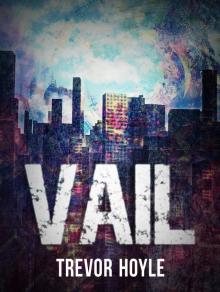 Vail
Vail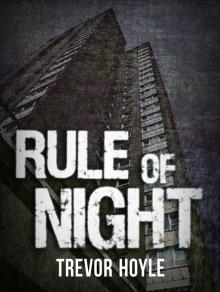 Rule of Night
Rule of Night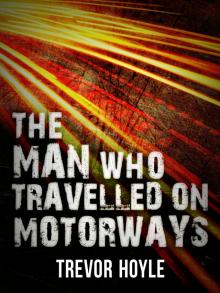 The Man Who Travelled on Motorways
The Man Who Travelled on Motorways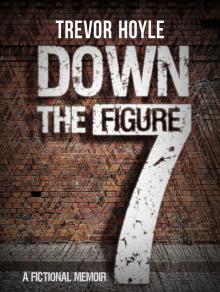 Down the Figure 7
Down the Figure 7 The Gods Look Down
The Gods Look Down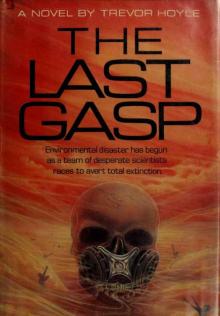 Last Gasp
Last Gasp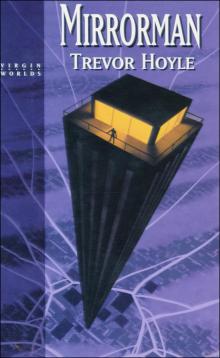 Mirrorman
Mirrorman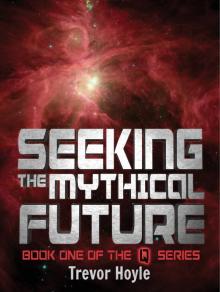 Seeking the Mythical Future
Seeking the Mythical Future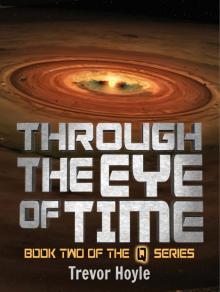 Through the Eye of Time
Through the Eye of Time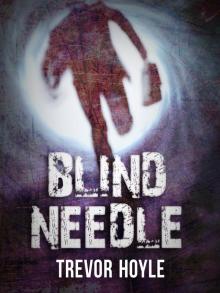 Blind Needle
Blind Needle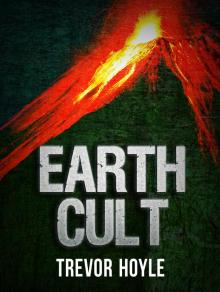 Earth Cult
Earth Cult